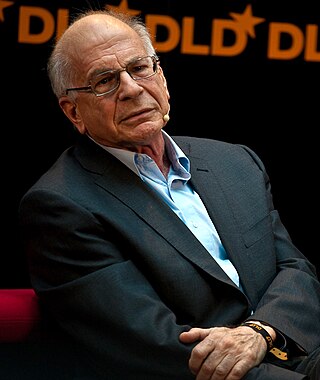
Gross domestic product (GDP) is a monetary measure of the market value of all the final goods and services produced in a specific time period by a country or countries. GDP is most often used by the government of a single country to measure its economic health. Due to its complex and subjective nature, this measure is often revised before being considered a reliable indicator.
Satisficing is a decision-making strategy or cognitive heuristic that entails searching through the available alternatives until an acceptability threshold is met. The term satisficing, a portmanteau of satisfy and suffice, was introduced by Herbert A. Simon in 1956, although the concept was first posited in his 1947 book Administrative Behavior. Simon used satisficing to explain the behavior of decision makers under circumstances in which an optimal solution cannot be determined. He maintained that many natural problems are characterized by computational intractability or a lack of information, both of which preclude the use of mathematical optimization procedures. He observed in his Nobel Prize in Economics speech that "decision makers can satisfice either by finding optimum solutions for a simplified world, or by finding satisfactory solutions for a more realistic world. Neither approach, in general, dominates the other, and both have continued to co-exist in the world of management science".

Daniel Kahneman is an Israeli-American author, psychologist and economist notable for his work on the psychology of judgment and decision-making, as well as behavioral economics, for which he was awarded the 2002 Nobel Memorial Prize in Economic Sciences. His empirical findings challenge the assumption of human rationality prevailing in modern economic theory.

Happiness is a positive and pleasant emotion, ranging from contentment to intense joy. Moments of happiness may be triggered by positive life experiences or thoughts, but sometimes it may arise from no obvious cause. The level of happiness for longer periods of time is more strongly correlated with levels of life satisfaction, subjective well-being, flourishing and eudaimonia. In common usage, the word happy can be an appraisal of those measures themselves or as a shorthand for a "source" of happiness. As with any emotion, the precise definition of happiness has been a perennial debate in philosophy.

Consumerism is a social and economic order in which the goals of many individuals include the acquisition of goods and services beyond those that are necessary for survival or for traditional displays of status. Consumerism has historically existed in many societies, with modern consumerism originating in western Europe before the Industrial Revolution and becoming widespread around 1900. In 1899, a book on consumerism published by Thorstein Veblen, called The Theory of the Leisure Class, examined the widespread values and economic institutions emerging along with the widespread "leisure time" at the beginning of the 20th century. In it, Veblen "views the activities and spending habits of this leisure class in terms of conspicuous and vicarious consumption and waste. Both relate to the display of status and not to functionality or usefulness."

Health economics is a branch of economics concerned with issues related to efficiency, effectiveness, value and behavior in the production and consumption of health and healthcare. Health economics is important in determining how to improve health outcomes and lifestyle patterns through interactions between individuals, healthcare providers and clinical settings. In broad terms, health economists study the functioning of healthcare systems and health-affecting behaviors such as smoking, diabetes, and obesity.
In social behavior, downshifting is a trend where individuals adopt simpler lives from what critics call the "rat race".

Consumption is the act of using resources to satisfy current needs and wants. It is seen in contrast to investing, which is spending for acquisition of future income. Consumption is a major concept in economics and is also studied in many other social sciences.

The Index of Sustainable Economic Welfare (ISEW) is an economic indicator intended to replace the gross domestic product (GDP), which is the main macroeconomic indicator of System of National Accounts (SNA). Rather than simply adding together all expenditures like the GDP, consumer spending is balanced by such factors as income distribution and cost associated with pollution and other unsustainable costs. The calculation excludes defence expenditures and considers a wider range of harmful effects of economic growth. It is similar to the genuine progress indicator (GPI).

A steady-state economy is an economy made up of a constant stock of physical wealth (capital) and a constant population size. In effect, such an economy does not grow in the course of time. The term usually refers to the national economy of a particular country, but it is also applicable to the economic system of a city, a region, or the entire world. Early in the history of economic thought, classical economist Adam Smith of the 18th century developed the concept of a stationary state of an economy: Smith believed that any national economy in the world would sooner or later settle in a final state of stationarity.

Anti-consumerism is a sociopolitical ideology that is opposed to consumerism, the continual buying and consuming of material possessions. Anti-consumerism is concerned with the private actions of business corporations in pursuit of financial and economic goals at the expense of the public welfare, especially in matters of environmental protection, social stratification, and ethics in the governing of a society. In politics, anti-consumerism overlaps with environmental activism, anti-globalization, and animal-rights activism; moreover, a conceptual variation of anti-consumerism is post-consumerism, living in a material way that transcends consumerism.

The Happy Planet Index (HPI) is an index of human well-being and environmental impact that was introduced by the New Economics Foundation in 2006. Each country's HPI value is a function of its average subjective life satisfaction, life expectancy at birth, and ecological footprint per capita. The exact function is a little more complex, but conceptually it approximates multiplying life satisfaction and life expectancy and dividing that by the ecological footprint. The index is weighted to give progressively higher scores to nations with lower ecological footprints.
The economics of happiness or happiness economics is the theoretical, qualitative and quantitative study of happiness and quality of life, including positive and negative affects, well-being, life satisfaction and related concepts – typically tying economics more closely than usual with other social sciences, like sociology and psychology, as well as physical health. It typically treats subjective happiness-related measures, as well as more objective quality of life indices, rather than wealth, income or profit, as something to be maximized.

Digital marketing is the component of marketing that uses the Internet and online-based digital technologies such as desktop computers, mobile phones and other digital media and platforms to promote products and services. Its development during the 1990s and 2000s changed the way brands and businesses use technology for marketing. As digital platforms became increasingly incorporated into marketing plans and everyday life, and as people increasingly used digital devices instead of visiting physical shops, digital marketing campaigns have become prevalent, employing combinations of search engine optimization (SEO), search engine marketing (SEM), content marketing, influencer marketing, content automation, campaign marketing, data-driven marketing, e-commerce marketing, social media marketing, social media optimization, e-mail direct marketing, display advertising, e-books, and optical disks and games have become commonplace. Digital marketing extends to non-Internet channels that provide digital media, such as television, mobile phones, callbacks, and on-hold mobile ring tones. The extension to non-Internet channels differentiates digital marketing from online marketing.
Degrowth is a term used for both a political, economic, and social movement as well as a set of theories that criticise the paradigm of economic growth. Degrowth is based on ideas from political ecology, ecological economics, feminist political ecology, and environmental justice, arguing that social and ecological harm is caused by the pursuit of infinite growth and Western "development" imperatives.

Sustainability is a social goal for people to co-exist on Earth over a long time. Specific definitions of this term are disputed and have varied with literature, context, and time. Experts often describe sustainability as having three dimensions : environmental, economic, and social, and many publications emphasize the environmental dimension. In everyday use, sustainability often focuses on countering major environmental problems, including climate change, loss of biodiversity, loss of ecosystem services, land degradation, and air and water pollution. The idea of sustainability can guide decisions at the global, national, and individual levels. A related concept is sustainable development, and the terms are often used to mean the same thing. UNESCO distinguishes the two like this: "Sustainability is often thought of as a long-term goal, while sustainable development refers to the many processes and pathways to achieve it."
Life satisfaction is a measure of a person's overall well-being, assessed in terms of mood, relationship satisfaction, achieved goals, self-concepts, and self-perceived ability to cope with life. Life satisfaction involves a favorable attitude towards one's life—rather than an assessment of current feelings. Life satisfaction has been measured in relation to economic standing, degree of education, experiences, residence, and other factors.
The OECD Better Life Index, created in May 2011 by the Organisation for Economic Co-operation and Development, is an initiative pioneering the development of economic indicators which better capture multiple dimensions of economic and social progress.

Post-growth is a stance on economic growth concerning the limits-to-growth dilemma — recognition that, on a planet of finite material resources, extractive economies and populations cannot grow infinitely. The term "post-growth" acknowledges that economic growth can generate beneficial effects up to a point, but beyond that point it is necessary to look for other indicators and techniques to increase human wellbeing.
Cultural differences can interact with positive psychology to create great variation, potentially impacting positive psychology interventions. Culture differences have an impact on the interventions of positive psychology. Culture influences how people seek psychological help, their definitions of social structure, and coping strategies.










